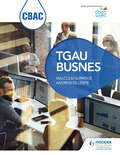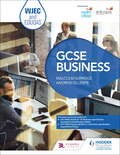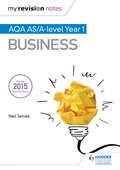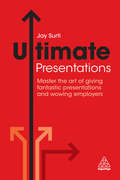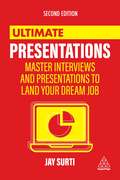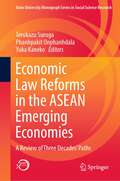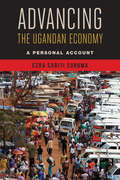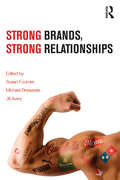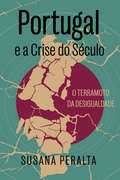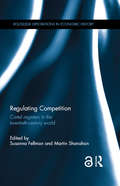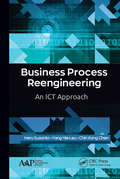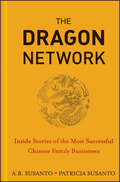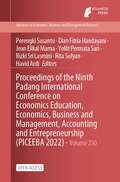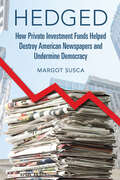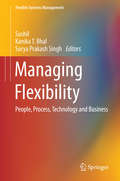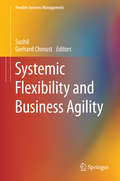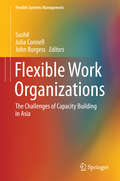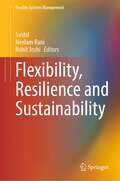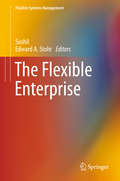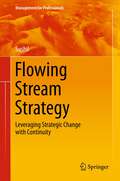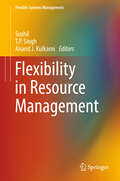- Table View
- List View
CBAC TGAU Busnes (WJEC GCSE Business Welsh-language edition)
by Malcolm Surridge Andrew Gillespiensure that every student can fulfil their potential with this tailor-made Student Book for the 2017 specification; our bestselling Business authors develop knowledge and skills through clear explanations, real-life examples and assessment practice questions.- Builds understanding of business concepts through accessible explanations, supported by definitions of key terms and tips that highlight important points and common misconceptions- Enables students to apply their knowledge to real business examples, issues and contexts in the 'Business insight' feature- Develops investigative, analytical and evaluation skills through multiple choice, short answer and case study/data response questions, sample answers and commentary- Encourages students to track their progress using learning outcomes, end-of-chapter summaries and knowledge-check questions- Helps students practise and improve their quantitative skills via the 'Maths moment' feature- Stretches students with questions that test their ability to make an informed judgementThis is a Welsh language edition
WJEC and Eduqas GCSE Business
by Malcolm Surridge Andrew GillespieExam Board: WJECLevel: GCSESubject: BusinessFirst Teaching: September 2017First Exam: June 2019Endorsed by WJEC/EduqasEnsure that every student can fulfil their potential with this tailor-made Student Book for the 2017 specifications; our bestselling Business authors develop knowledge and skills through clear explanations, real-life examples and assessment practice questions.- Builds understanding of business concepts through accessible explanations, supported by definitions of key terms and tips that highlight important points and common misconceptions- Enables students to apply their knowledge to real business examples, issues and contexts in the 'Business insight' feature- Develops investigative, analytical and evaluation skills through multiple choice, short answer and case study/data response questions, sample answers and commentary- Encourages students to track their progress using learning outcomes, end-of-chapter summaries and knowledge-check questions- Helps students practise and improve their quantitative skills via the 'Maths moment' feature- Stretches students with questions that test their ability to make an informed judgementThis book covers the content of:- 2017 WJEC GCSE (A*-G) Business specification regulated by Qualifications Wales- 2017 WJEC Eduqas GCSE (9-1) Business specification regulated by Ofqual
My Revision Notes: AQA AS Business Second Edition
by Malcolm Surridge Neil JamesManage your own revision with step-by-step support from experienced teacher and examiner Neil James. Use specific case studies to improve your knowledge of business processes and topics. Apply business terms accurately with the help of definitions and key words.- Plan and pace your revision with the revision planner- Use the expert tips to clarify key points- Avoid making typical mistakes with expert advice- Test yourself with end-of-topic questions and answers and tick off each topic as you complete it- Get exam ready with last minute quick quizzes at www.hoddereducation.co.uk/myrevisionnotes
Ultimate Presentations: Master the Art of Giving Fantastic Presentations and Wowing Employers (Ultimate Series)
by Jay SurtiDoes the thought of delivering a presentation fill you with dread? Do you want to learn how to give a fantastic presentation and impress an audience? Ultimate Presentations covers every aspect of this essential business skill: how to prepare, how to structure a great presentation, using technology and visual aids, communicating a strong message, tailoring your presentation to your audience, highlighting your personal skills through your presentation, time management and dealing with Q and As. Business presentation expert Jay Surti guides you through the most common obstructions to giving good presentations and how to overcome them, from nerves and uncomfortable body language, to voice tone and physical habits. Insightful guidance on coping with the unexpected, such as interruptions, technology breakdowns or difficult questions helps you to feel prepared and confident, no matter what happens during your presentation. The ability to deliver outstanding presentations is a lifelong skill that remains relevant throughout an entire career and can boost employability and progression. From the best-selling Ultimate series, Ultimate Presentations is your one-stop guide to acing that presentation and wowing an employer.About the series: The Ultimate series contains practical advice on essential job search skills to give you the best chance of getting the job you want. Taking you all the way from starting your job search to completing an interview, it includes guidance on CV or résumé and cover letter writing, practice questions for passing aptitude, psychometric and other employment tests, and reliable advice for interviewing.
Ultimate Presentations: Master Interviews and Presentations to Land Your Dream Job (Ultimate Series)
by Jay SurtiPresentations: they may fill us with dread, but they're essential to getting ahead at work, and can be vital to landing your dream role to begin with. You don't have to be frozen with fear, or bored to death with a dull PowerPoint deck! In Ultimate Presentations, business presentation expert Jay Surti guides you through the most common obstructions to giving good presentations and how to overcome them, from nerves and uncomfortable body language, to voice tone and physical habits. Insightful guidance on coping with the unexpected, such as interruptions, technology breakdowns or difficult questions helps you to feel prepared and confident, no matter what happens during your presentation.Ultimate Presentations covers every aspect of fantastic and effective presentations: -how to prepare-how to structure a great presentation-using technology and visual aids-communicating a strong message-tailoring your presentation to your audience-highlighting your personal skills through your presentation-time management and dealing with Q and AsNow including a new chapter on presenting your personal brand, Ultimate Presentations will help you to deliver outstanding presentations when it counts. About the series: The Ultimate series contains practical advice on essential job search skills to give you the best chance of getting the job you want. Taking you all the way from starting your job search to completing an interview, it includes guidance on CV or resume and cover letter writing, practice questions for passing aptitude, psychometric and IQ tests, and reliable advice for interviewing.
Economic Law Reforms in the ASEAN Emerging Economies: A Review of Three Decades’ Paths (Kobe University Monograph Series in Social Science Research)
by Terukazu Suruga Phanhpakit Onphanhdala Yuka KanekoThis book reviews the periodic changes in the legal policies of the late-developing ASEAN countries, often known as the CLMV countries (Cambodia, Laos, Myanmar, and Vietnam), in their continuous path toward globalization after the collapse of the socialist bloc. The book also identifies the characteristics of the legal reforms in their present stage guided by the common framework under the ASEAN Economic Community (AEC) moving toward 2025.The first stage is illustrated by the ASEAN-style utilization of foreign investments as reflected in all investment laws and policies of CLMV countries in the 1990s, which featured entry control (as “sticks”) and investment incentives (as “carrots”). Those controls and incentives were the means to induce investors to assume various performance requirements to contribute to industrial policies. The second stage witnessed a shift toward enhanced liberalization as an endeavor toward the WTO accession during the 2000s, as seen in the integrated investment laws that appealed for the national treatment of foreign investors. At the same time, those investment laws emphasized the substantive provisions (e.g., fair and equitable treatment and indirect expropriation) and procedural protections (e.g., provision of Investor–State Dispute Resolution mechanisms) as an appeal for stabilization of the investment climate. The third stage of legal policy, as evidenced by the recent amendments to the investment laws, is newly focused on environmental and social considerations, which seems to be an indispensable response to the increasing social protests against the negative impacts of investment promotion. Simultaneously, the means of administrative controls over investors, established in the first stage, are uniquely utilized for the realization of new goals.
Advancing the Ugandan Economy
by Ezra Sabiti SurumaInternal conflicts, dictatorship, and economic disintegration characterized the first twenty-five years of Uganda's independence from British colonial rule, which culminated in the reign of Idi Amin and a violent civil war. The country has since achieved an astounding turnaround of stability and growth. Advancing the Ugandan Economy is a first-hand look at the remarkable policy changes that took place from 1986 to 2012 and their effect in contrast with the turbulent events after independence.Ezra Suruma held several key positions in the Ugandan government during the nation's transition period, including minister of finance. His insightful recounting of those times demonstrates that African countries can achieve economic stability and sustain rapid growth when they meet at least two interdependent conditions: establishing a stable and secure political framework and unleashing entrepreneurialism. Suruma also highlights the strategic areas that still require fundamental reform if Uganda is to become a modern state and shares his vision for the future of his country.Rarely in African history has so much positive political and economic transformation of a country been achieved in such a short time. Suruma's account of the commitment, determination, vision, and dexterity of the Ugandan government holds invaluable lessons in managing the still complex policy challenges facing the African continent.
Advancing the Ugandan Economy: A Personal Account
by Ezra Sabiti SurumaInternal conflicts, dictatorship, and economic disintegration characterized the firsttwenty-five years of Uganda's independence from British colonial rule, which culminatedin the reign of Idi Amin and a violent civil war. The country has since achieved anastounding turnaround of stability and growth. Advancing the Ugandan Economy isa first-hand look at the remarkable policy changes that took place from 1986 to 2012and their effect in contrast with the turbulent events after independence. Ezra Suruma held several key positions in the Ugandan government during the nation'stransition period, including minister of finance. His insightful recounting of thosetimes demonstrates that African countries can achieve economic stability and sustainrapid growth when they meet at least two interdependent conditions: establishinga stable and secure political framework and unleashing entrepreneurialism. Surumaalso highlights the strategic areas that still require fundamental reform if Uganda is tobecome a modern state and shares his vision for the future of his country. Rarely in African history has so much positive political and economic transformationof a country been achieved in such a short time. Suruma's account of the commitment,determination, vision, and dexterity of the Ugandan government holds invaluablelessons in managing the still complex policy challenges facing the African continent.
Strong Brands, Strong Relationships
by Susan Fournier, Michael Breazeale, and Jill AveryFrom the editor team of the ground-breaking Consumer-Brand Relationships: Theory and Practice comes this new volume. Strong Brands, Strong Relationships is a collection of innovative research and management insights that build upon the foundations of the first book, but takes the study of brand relationships outside of traditional realms by applying new theoretical frameworks and considering new contexts. The result is an expanded and better-informed account of people’s relationships with brands and a demonstration of the important and timely implications of this evolving sub-discipline. A range of different brand relationship environments are explored in the collection, including: online digital spaces, consumer collectives, global brands, luxury brands, branding in terrorist organizations, and the brand relationships of men and transient consumers. This book attends to relationship endings as well as their beginnings, providing a full life-cycle perspective. While the first volume focused on positive relationship benefits, this collection explores dysfunctional dynamics, adversarial and politically-charged relationships, and those that are harmful to well-being. Evocative constructs are leveraged, including secrets, betrayals, anthropomorphism, lying, infidelity, retaliation, and bereavement. The curated collection provides both a deeper theoretical understanding of brand relationship phenomena and ideas for practical application from experiments and execution in commercial practice. Strong Brands, Strong Relationships will be the perfect read for marketing faculty and graduate students interested in branding dynamics, as well as managers responsible for stewarding brands.
Hurricane Katrina and the Forgotten Coast of Mississippi
by Susan L. Cutter Christopher T. Emrich Jerry T. Mitchell Walter W. Piegorsch Mark M. Smith Lynn Weber Susan L. Cutter Christopher T. Emrich Jerry T. Mitchell Walter W. Piegorsch Mark M. SmithHurricane Katrina slammed into the Gulf Coast in August 2005 with devastating consequences. Almost all analyses of the disaster have been dedicated to the way the hurricane affected New Orleans. This volume examines the impact of Katrina on southern Mississippi. While communities along Mississippi's Gulf Coast shared the impact, their socioeconomic and demographic compositions varied widely, leading to different types and rates of recovery. This volume furthers our understanding of the pace of recovery and its geographic extent, and explores the role of inequalities in the recovery process and those antecedent conditions that could give rise to a "recovery divide. " It will be especially appealing to researchers and advanced students of natural disasters and policy makers dealing with disaster consequences and recovery.
Portugal e a Crise do Século: O terramoto da desigualdade
by Susana PeraltaUm guia para entender a crise em que estamos prestes a mergulhar. Um manual para não nos afundarmos. Pela economista Susana Peralta. «Nenhuma economia está preparada para um choque destes. É como um gigantesco terramoto que assola o tecido económico e social. Mas há tecidos mais sólidos do que os outros para absorver as ondas de choque do terramoto. As nossas economias estavam mal preparadas para este choque. O tecido estava lasso.» Habituámo-nos a associar a palavra economia a números, alguns inescrutáveis para o cidadão comum. De tal forma que nos esquecemos que há pessoas por detrás dos números. Pessoas e vidas muito diversas no seu quotidiano, no local onde trabalham e moram, no que estudam, no que leem, na forma de usufruir dos momentos de lazer. Até nos seus sonhos e no futuro que idealizam e tentam construir. Uma parte dessa diversidade é boa e desejável, pois permite-nos fazer o que a nossa individualidade ditar para tentarmos ser felizes. Outra é negativa, já que resulta das colossais diferenças de oportunidades e poder com que cada um enfrenta a vida, criando desequilíbrios e desigualdades profundas no tecido social. Susana Peralta, reputada economista e professora de Economia, analisa o país e as pessoas no rebentar da maior crise global do século XXI: uma crise sanitária, económica e social sem precedentes e com consequências devastadoras, que nos obriga a um olhar crítico sobre o nosso passado, presente e futuro.
Regulating Competition: Cartel registers in the twentieth-century world (Routledge Explorations in Economic History)
by Susanna Fellman; Martin ShanahanCartels, trusts and agreements to reduce competition between firms have existed for centuries, but became particularly prevalent toward the end of the 19th century. In the mid-20th century governments began to use so called ‘cartel registers’ to monitor and regulate their behaviour. This book provides cases studies from more than a dozen countries to examine the emergence, application and eventual decline of this form of regulation. Beginning with a comparison of the attitudes to regulation that led to monitoring, rather than prohibiting cartels, this book examines the international studies on cartels undertaken by the League of Nations before World War II. This is followed by a series of studies on the context of the registers, including the international context of the European Union, and the importance of lobby groups in shaping regulatory outcomes, using Finland as an example. Section two provides a broad international comparison of several countries’ registers, with individual studies on Norway, Australia, Japan, Germany, Sweden and the Netherlands. After examining the impact of registration on business behaviour in the insurance industry, this book concludes with an overview of the lessons to be learnt from 20th century efforts to regulate competition. With a foreword by Harm Schroter, this book outlines the rise and fall of a system that allowed nations to tailor their approach to regulating competition to their individual circumstances whilst also responding to the pressures of globalisation that emerged after the Second World War. This book is suitable for those who are interested in and study economic history, international economics and business history. Chapter 10 of this book is freely available as a downloadable Open Access PDF at http://www.taylorfrancis.com under a Creative Commons Attribution-Non Commercial-No Derivatives (CC-BY-NC-ND) 4.0 license.
Business Process Reengineering: An ICT Approach
by Heru Susanto Fang-Yie Leu Chin Kang ChenThis volume shows how ICT (information and communications technology) can play the role of a driver of business process reengineering (BPR). ICT can aid in enabling improvement in BPR activity cycles as it provides many components that enhance performance that can lead to competitive advantages. IT can interface with BPR to improve business processes in terms of communication, inventory management, data management, management information systems, customer relationship management, computer-aided design, computer-aided manufacturing (CAM), and computer-aided engineering. This volume explores these issues in depth.
The Dragon Network
by Patricia Susanto A. B. SusantoWhat's driving the burgeoning global Chinese family businesses?Chinese family businesses are the driving force behind Asia's economic prosperity. As the world becomes more global they have had to adapt to the new environment. This timely book draws on an extensive regional survey to reveal the key players and the strategies that will drive their success going forward. The book discusses and analyzes the business life and achievements of some prominent overseas Chinese family businesses in Asia and reveals their life philosophies, their business journey, and their family role in business. Includes analysis regarding how the senior Chinese generations prepare their children to run the business in the future Reveals that flexibility, ability to adapt to changing business environments, and resilience contribute to the success of many overseas Chinese family businessesOffers illustrative examples of successful family businesses from Malaysia, Indonesia, The Philippines, and ChinaBased in solid research and filled with illustrative examples, The Dragon Network offers an inside look at how family businesses succeed and thrive in Asia.
Proceedings of the Ninth Padang International Conference on Economics Education, Economics, Business and Management, Accounting and Entrepreneurship (Advances in Economics, Business and Management Research #672)
by Perengki Susanto Dian Fitria Handayani Jean Elikal Marna Yollit Permata Sari Rizki Sri Lasmini Rita Sofyan Havid ArdiThis is an open access book.This conference is aimed to provide a medium for participants in disseminating their research ideas and results as well as developing their networks. Through the participants’ contribution, it is hoped that this conference could provide a deeper understanding of Economics Education, Economics, Business and Management, Accounting and Entrepreneurship issues.The theme for The Ninth Padang International Conference on Economics Education, Economics, Business and Management, Accounting and Entrepreneurship (PICEEBA) is “Leap to the imminent future: Seizing Opportunities in Education, Economics, and Business”. In this conference, we invite experts, practitioners and observers from all around the globe the to sit together to explore various issues and debates on economics education, economics, bussines and management, accounting, and entrepreneurship.The conference will be held online on May 21st, 2022 via Zoom Meeting and "UNP Video Streaming" Youtube Channel. We welcome empirical or conceptual contributions by any method or approach, especially those relevant to the issues of Education in Economics, Economics, Business and Management, Accounting and Entrepreneurship
Hedged: How Private Investment Funds Helped Destroy American Newspapers and Undermine Democracy (The History of Media and Communication)
by Margot SuscaThe untold history of an American catastrophe The ultrawealthy largely own and guide the newspaper system in the United States. Through entities like hedge funds and private equity firms, this investor class continues to dismantle the one institution meant to give voice to average citizens in a democracy. Margot Susca reveals the little-known history of how private investment took over the newspaper industry. Drawing on a political economy of media, Susca’s analysis uses in-depth interviews and documentary evidence to examine issues surrounding ownership and power. Susca also traces the scorched-earth policies of layoffs, debt, cash-outs, and wholesale newspaper closings left behind by private investors and the effects of the devastation on the future of news and information. Throughout, Susca reveals an industry rocked less by external forces like lost ad revenue and more by ownership and management obsessed with profit and beholden to private fund interests that feel no responsibility toward journalism or the public it is meant to serve.
Managing Flexibility
by Sushil Kanika T. Bhal Surya Prakash SinghThis edited book provides a conceptual framework of managing flexibility in the areas of people, process, technology and business supported by researches/case applications in various types of flexibilities in business. The book is organized into following five parts: (i) Managing Flexibility; (ii) People Flexibility; (iii) Process Flexibility; (iv) Flexibility in Technology and Innovation Management; and (v) Business Flexibility. Managing flexibility at the level of people, process, technology and business encompasses the requirements of both choice and speed. The need for managing flexibility is growing to cope with the developments and challenges in the global business environment. This can be seen from reactive as well as proactive perspectives. Flexibility is a major dimension of business excellence and deals with a paradoxical view point such as stability and dynamism, continuity and change, centralization and decentralization, and so on. It needs to be managed at the levels of people, process, technology and various business functions and it is important to create flexibility at the level of people to create and manage flexibility in processes and technologies in order to support flexible business requirements.
Systemic Flexibility and Business Agility
by Sushil Gerhard ChroustThis book provides a conceptual framework for systemic flexibility and business agility, drawing on a basis of research/case applications in various types of flexibility and agility in business. The selected papers address a variety of issues concerning the theme of systemic flexibility and business agility and are organized into following five parts: (i) Systemic and Strategic Flexibility; (ii) Information and Business Agility; (iii) Flexibility, Innovation and Business Excellence; (iv) Flexibility in Value and Supply Chains; and(v) Financial Flexibility and Mergers & Acquisitions. Flexibility and agility in business are emerging as key dimensions of business excellence that encompass the requirements of both choice and speed. The two concepts, flexibility and agility, have been used in multiple ways and often interchangeably, both in literature and in practice. The growing need for flexibility/agility in business can be seen from reactive as well as proactive perspectives. A business enterprise is expected to possess reactive flexibility/ agility (as adaptability and responsiveness) in order to cope with the changing and uncertain business environment. It may also endeavor to intentionally generate flexibility/agility as a strategic change in a variety of ways, such as leadership change, reengineering, innovation in products and processes, use of information and communication technology, and learning orientation.
Flexible Work Organizations
by Sushil Julia Connell John BurgessThis book focuses on the challenges of capacity building for flexible work organizations in Asia, and demonstrates how business enterprises practice reactive flexible capacity (in the form of adaptiveness and responsiveness) to cope with changing and uncertain business environments. The book provides examples of how this can be achieved by means of various organizational change initiatives, leadership strategies, re-engineering, innovation in products and processes, the use of information and communication technology, reshaping learning orientations, and more. As these topics are supported by research and case studies situated in different sectors and countries across Asia, the book will provide a useful resource for a broad readership including: management students and researchers, practicing business managers, consultants, and professional institutions.
Flexibility, Resilience and Sustainability (Flexible Systems Management)
by Sushil Neelam Rani Rohit JoshiThis book discusses initiatives intended to promote strategic flexibility, resilience, sustainability, and information system flexibility and analytics, through AI, HR analytics, employee attrition using perspectives from machine learning, agile competencies, agile organization, digital recruitment, e-governance, cyber security controls, and cyber security risk management. It explores areas such as banking system, medical tourism, pharmaceutical industry, defense sector, online shopping, to name some. It brings different perspectives on how to improve the resilience of human resources in organizations through employee engagement, exploration, experimentation, and so on, to create sustainable organizations. There is also some focus on innovation and environmental sustainability concerns, co-worker support, exploring the linkages, and in one case, culture essentials for Industry 5.0. Divided into three parts, covering a range of topics, contexts, and methods used to understand the relevant issues in flexibility, resilience, and sustainability, thes book is a useful addition to the literature on the topic as well as a practical resource for practitioners. It will be a useful resource for a variety of audiences such as management students and researchers, practicing business managers, consultants, and professional institutions.
The Flexible Enterprise
by Sushil Edward A. StohrThe need for enterprise flexibility in an era of rapidly advancing technology, increasing competition, and globalization, is apparent. Flexibility can be thought of as an ability of the enterprise to quickly and efficiently respond to market changes and to bring new products and services quickly to the market place. Beyond this definition, a truly flexible enterprise should proactively change the market through its ability to create new and innovative products and services. The proposed book is intended to provide a conceptual framework of 'Flexible Enterprise' supported by researches/case applications in various types of flexibilities exhibited by a flexible enterprise. The selected papers from a variety of issues concerning the planning and operation of a flexible enterprise are organized into following four parts: I Enterprise and Strategic Flexibility II Organizational Flexibility III Business Process and Information Systems Flexibility IV Operations Flexibility
The Flexible Enterprise (Flexible Systems Management)
by Sushil Edward A. StohrThe need for enterprise flexibility in an era of rapidly advancing technology, increasing competition, and globalization, is apparent. Flexibility can be thought of as an ability of the enterprise to quickly and efficiently respond to market changes and to bring new products and services quickly to the market place. Beyond this definition, a truly flexible enterprise should proactively change the market through its ability to create new and innovative products and services. The proposed book is intended to provide a conceptual framework of ‘Flexible Enterprise’ supported by researches/case applications in various types of flexibilities exhibited by a flexible enterprise. The selected papers from a variety of issues concerning the planning and operation of a flexible enterprise are organized into following four parts:I Enterprise and Strategic FlexibilityII Organizational FlexibilityIII Business Process and Information Systems FlexibilityIV Operations Flexibility
Flowing Stream Strategy: Leveraging Strategic Change with Continuity
by Sushil SushilThough the concern regarding the confluence of continuity and change is well accepted, there is hardly any well known framework in the literature that can be used as a benchmark to deal with this paradoxical issue. Keeping in view the significance of the topic and the lack of practical frameworks in managing continuity and change this book is an endeavor to fill the gap. The main proposition of the book is that the strategic management of change could be better leveraged with clear understanding of continuity of the organization and consciously managing the vital and desirable areas of continuity along with change, rather than leaving the continuity to be managed by default. The continuity of any company provides the bedrock along which the flow of change could be channelized. It adopts flowing stream as the principal metaphor for continuity and change to be taken side by side. It can be treated as a stepping stone to inspire a lot of research in this area.
Flexibility in Resource Management (Flexible Systems Management)
by Sushil, T. P. Singh and Anand J. KulkarniThis book provides a conceptual ‘Flexibility in Resource Management’ framework supported by research/case applications in various related areas. It links and integrates the flexibility aspect with resource management to offer a fresh perspective, since flexibility in different levels of resource management is emerging as a key concern -- a business enterprise needs to have reactive flexibility (as adaptiveness and responsiveness) to cope with the changing and uncertain business environment. It may also endeavor to intentionally create flexibility by way of leadership change, re-engineering, innovation in products and processes, use of information and communication technology, and so on. The selected papers discussing a variety of issues concerning flexibility in resource management, are organized into following four parts: flexibility and innovation; flexibility in organizational management; operations and technology management; and financial and risk management. In addition to addressing the organizational needs of corporate bodies spread across the globe, the book serves as a useful reference resource for a variety of audiences including management students, researchers, business managers, consultants and professional institutes.
Informelle Kommunikation in virtuellen Teams (BestMasters)
by Kathrin SuslikIn diesem Buch wird thematisiert, wie die Virtualisierung von Teams den Umfang der informellen Kommunikation zwischen den Teammitgliedern beeinflusst und durch welche Faktoren dieser Einfluss moderiert wird. Dazu wurden nach einer Darstellung des Forschungsstands und Begründung der Forschungslücke aus der Theorie sieben Untersuchungshypothesen hergeleitet und diese anhand einer qualitativen Studie überprüft. Die Untersuchung ergab, dass der Umfang informeller Kommunikation bezogen auf die Häufigkeit der Interaktionen bei virtueller Zusammenarbeit erheblich abnimmt. Die Ergebnisse weisen auf eine diesen Einfluss moderierende Wirkung der Aufgabeninterdependenz, der Medienreichhaltigkeit, des mit der Kontaktaufnahme verbundenen Aufwands sowie des sozio-emotionalen Zustands des Teams hin. Auf Basis der Ergebnisse werden Implikationen für Forschung und Praxis abgeleitet.
